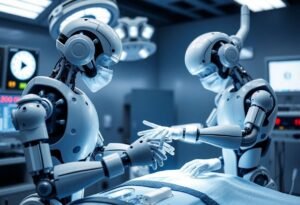Biotechnology is at the forefront of transforming how we understand aging and its related diseases. As our population ages, innovative approaches are needed to enhance longevity while improving the quality of life. This article explores how biotechnology is revolutionizing aging research, highlighting groundbreaking innovations and their implications.
The Intersection of Biotechnology and Aging Research
In the last few decades, the intersection of biotechnology and aging research has significantly advanced, leading to exciting developments. Researchers leverage genetic engineering and genomic technologies to unravel the complexities of aging. This powerful synergy allows scientists to dissect the biological mechanisms underpinning age-related decline and enhance therapeutic strategies to combat aging. Notably, innovations such as CRISPR gene editing have emerged, enabling precise modifications in genes associated with aging, potentially leading to breakthroughs in age-related disease treatment.
Stem Cell Therapy: A Promising Avenue
Stem cell therapy is another vital aspect of **biotechnology** that has gained traction in aging research. By harnessing the regenerative capabilities of stem cells, researchers are investigating their potential to repair damaged tissues and organs due to aging. Studies have shown that stem cell treatment can rejuvenate aged tissues, offering a promising path to restoring function. Furthermore, advancements in cellular reprogramming technology are paving the way for more effective treatments, enhancing the potential for stem cells to provide not just symptom relief, but also to address the root causes of aging.
Biomarkers of Aging: Identifying Longevity
Biomarkers of aging serve as critical tools in understanding the aging process and its impact on health. Through biotechnology, researchers are developing and validating biomarkers that indicate an organism’s biological age. These innovations provide insights into the effectiveness of anti-aging therapies and allow researchers to tailor strategies for individuals. For instance, identifying specific genetic markers associated with longevity can lead to personalized medicine approaches, ensuring that interventions are targeted and effective.
Nanotechnology in Anti-Aging Innovations
Nanotechnology is proving to be a game-changer in aging research. By manipulating materials at the atomic and molecular levels, biotechnology experts are developing nanoscale solutions to enhance treatment delivery and efficacy. For example, nanoparticles are being engineered to target senescent cells, which contribute to aging and age-related diseases. This targeted approach not only improves therapeutic outcomes but also minimizes side effects, representing a significant advancement in age-related therapy.
The Role of Artificial Intelligence in Aging Research
Innovative applications of artificial intelligence (AI) in biotechnology are revolutionizing how researchers approach aging studies. AI algorithms analyze vast datasets, identifying patterns and predicting outcomes with unprecedented accuracy. By leveraging machine learning, researchers can discover new drug candidates faster and develop personalized treatment regimens based on individual genetic profiles. Such integrations promise to accelerate the pace of research and bring more effective anti-aging therapies to the market.
The Future of Aging Research Through Biotechnology
The future of aging research is bright, driven by continual advancements in biotechnology. As scientists uncover more about the biological foundations of aging, the potential for novel interventions increases. With innovations such as gene therapy and stem cell technology at the forefront, there is hope for extending not just life expectancy but also healthspan. As we look ahead, the importance of biotechnology in shaping our understanding and management of aging becomes undeniably clear.
Disclaimer: This article is for informational purposes only and does not constitute medical advice. Always consult with a healthcare professional regarding medical conditions.





















